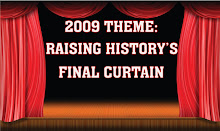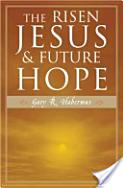How Should Believers View History?
Even a novice student of history is familiar with George Santayana's famous quote, "those who cannot remember the past are condemned to repeat it."(1) While many are familiar with Santayana's statement, few have given it much though beyond its common application to convince high school history students that history is important. However, if one subjects the contents of this quote to critical analysis it demonstrates why the information in this new series of articles is critical for believers to consider.
Santayana's statement encapsulates one of history's great debates regarding the philosophical nature of time itself. Is time and therefore history cyclical like Hinduism and indigenous religions teach, or linear possessing both a beginning and ending toward which humanity is advancing? A thoughtful reading of Santayana highlights the following paradox; history is both cyclical and linear. Implicit within Santayana's comment is the notion that if humanity forgets about their past mistakes, their forgetfulness will condemn the species to a cyclic fate of revisiting past mistakes. Conversely, cyclical reoccurrence can be avoid and linear progress continued by acknowledging past mistakes thereby allowing mankind to avoid the same missteps in the present as well as future.
Recent months have seen much discussion amongst grace believers regarding philosophical views of history. In April 2009 Brother Richard Jordan taught a series of seminars entitled Welcome to Winter in which he argued for a seasonal view of history. The life of a nation follows the changing seasonal patterns (winter, spring, summer, fall) thereby establishing a cyclical paradigm of history, according to Jordan. Brother Jordan married Biblical teaching with the seminal historical work of William Strauss and Neil Howe, authors of Generations: The History of America's Future and The Fourth Turning, to argue for a cyclical approach to history.
While seasonality is clearly observable in history, the acceptance of cyclicality at the expense of linear progression leaves the believer with an incomplete historical paradigm. Mid-Acts Grace Believers utilize a strict linear model when teaching how to rightly divide the Word of Truth. When we speak about how God has worked in the past (time past), how God is working in the present (but now), and how God will work in the future (ages to come), we are utilizing a strictly linear view of history. Time originated in Genesis 1 and is advancing forward in linear fashion toward a prophesied end, the establishment of the new heavens and new earth. When the Dispensation of the Fullness of Time arrives the purpose for which God created time will have been fulfilled. One could argue that mid-Acts dispensationalists are the most linear thinkers around.
How then do we reconcile the cyclical with the linear? Is there room in our linear dispensational understanding of time for seasonality, and if so where and how does it fit? Herein lies the goal for the forthcoming articles in this series, to reconcile cyclical and linear historical concepts thereby developing a more complete and functional paradigm of history. Second, we will tackle recent attacks on the objectivity of history in an attempt to demonstrate how Biblical Christianity is predicated on the notion of objective history. The Gospel of Grace is based upon the objective historical reality of Christ's death, burial, and resurrection. Any attack on the knowability of history is an assault upon our faith. Grace believers need to be equipped to answer those who would seek to distort history for the furtherance of their own agendas.
Endnotes:
- George Santayana, The Life of Reason, Volume 1, 1905.


























4 comments:
I recall Pastor Jordan touching on the "seasonality" of history at last Falls bible conference . I have recently read a post from Casey Research on same . If I may , I'd like to post the link to the 17 page PDF "Into the Fourth Turning " , an interview with Neil Howe.
Looking around in our times today, one can easily envision a repeat of the 1930's and its world political upheavels . Its frightening to imagine . Looking down at history, one can clearly see that mankind is not getting better ( man made millenium here on earth?) . Looking up, through the eyeglasses of God's word , rightly divided , one can see the grand , glorious and eternal plan , which God has purposed in himself ,for us who believe, through Christ Jesus our Lord . I have no hope in mankinds ability to bring about heaven on earth , nor do I believe I should . Very good article ! I look forward to reading and learning more. Bill K.
Oops - forgot the link to
"Into the Fourth Turning " , an interview with Neil Howe.
http://caseyresearch.com/pdfs/20090922_TheFourthTurningJMD.pdf
Very much looking forward to the reconciliation of thinking on these two concepts. Linear involves one direction, which brings us to God eternal purpose but we do see the cycles of life too.
Perhaps my blog entry of September lst gives a practical outlook:
Einstein and Faulkner
Einstein said the arrow of time flies in only one direction. Faulkner, being from Mississippi, understood the matter differently. He said the past is never dead; it’s not even past.
Memory and grief prove Faulkner right enough, but Einstein knew the finality of action.
And thanks Bill K. for your remarks...perhaps I have echoed your thoughts a bit closely, but I too have no hope in mankind and rejoicing in God's eternal plan. - Linda
Bill and Linda,
Thank you for your interest in this series of articlas. I assure you that by the time I am done with what I have plan a workable framework will emerge. I am going to look at things from viewpoint of history and Scritpure. So please sit tight and keep reading.
Bryan
Post a Comment